Are we really polarized, and does it matter?
The short answer is we have more of a perception of polarization, than actual polarization. But let's unpack this, becase like anything, its not that simple.
Have you ever had one of those text chats that turns into a whirlwind of thoughts about society and human nature? Well, that happened to me last week, and it was with somebody who disagreed with something I said.

As I do with most people who disagree with me, I wanted to chat more. So, I suggested we try to talk it out. Their response was, "I'm not interested in debating with people who have already made up their minds." But I had not made up my mind; I’m actually all about challenging my most certain views. Hence the name of my newsletter.
But they thought I had and were not interested. They just wanted me to get rid of what I had said that they disagreed with.
Then, it got me thinking about another chat I had during the campaign last year with a student at Victoria University who was questioning why they should bother engaging with people whose views they found harmful to minority and vulnerable groups. The frustration and righteousness in their voice were palpable. They felt that engaging with them was endorsing their ideas in some ways. And I was wrong for suggesting they talk to them.
While mulling over these encounters, I stumbled upon a social media post by Tamatha Paul that said, "Radicals just mean understanding things at their source." This gave me some pause. I struggled to find out how we agreed on this. My take on being radical implies being less flexible; you will do whatever it takes to achieve your cause, usually with unrealistic expectations of what is possible. And to want to find the source of something, you need flexibility, compromise, and honesty. This has little to do with what is possible in reality and is usually a very hard thing to solve. But again, it was a text that got me thinking about why we seem to be so polarized.
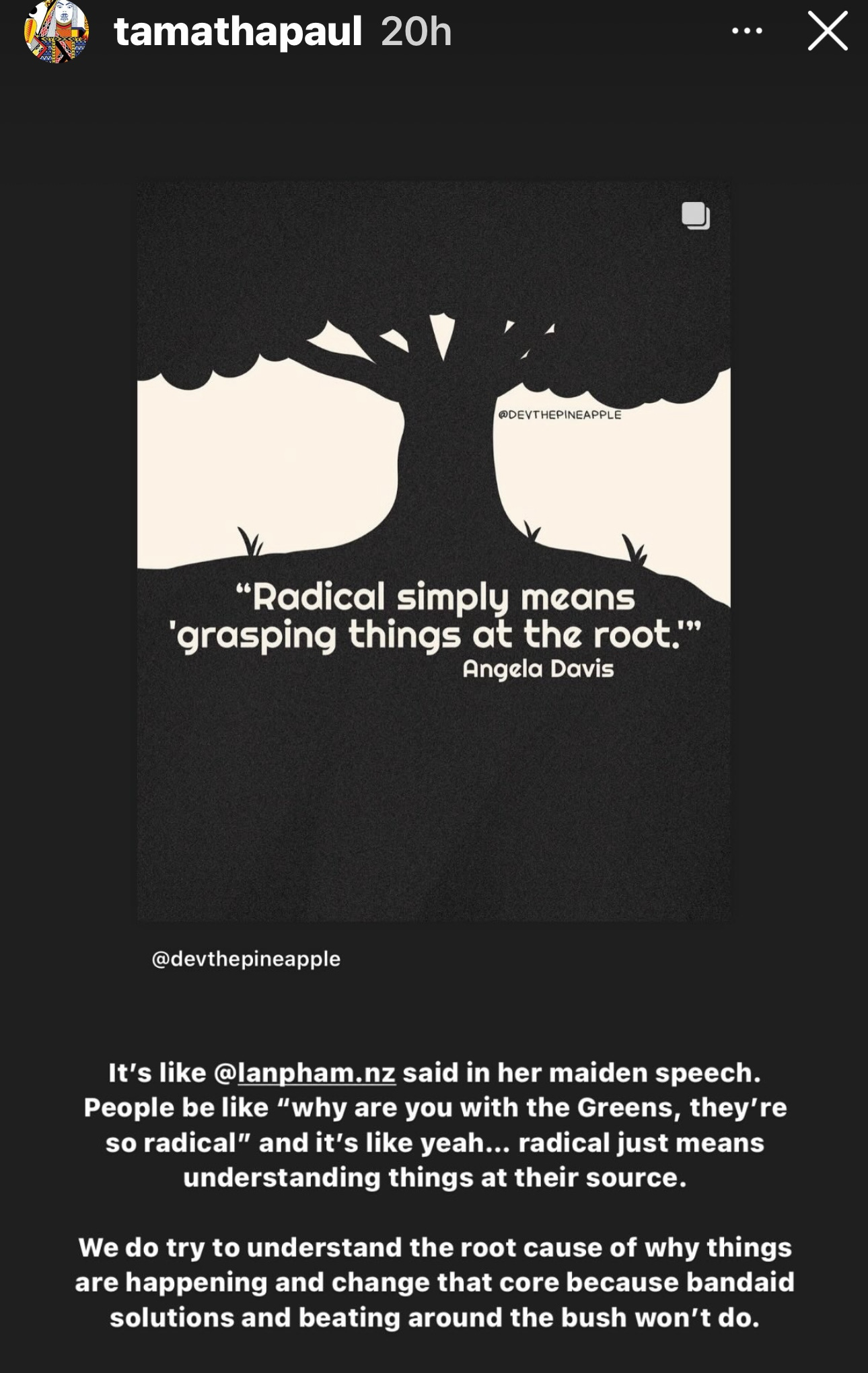
So, how polarized are we really?
It's like we're caught in this cycle, right? On one hand, there's this desire for safety and comfort among like-minded folks. Homogenous groups will always be more cohesive, but we are battling to be more diverse, inclusive, and tolerant, trying to convince ourselves at every level that diversity is always good and better for everybody (a topic for another weekly post, because I can talk about that all day).
We have developed wild and problematic assumptions that the Right is always racist and wrong and the Left is always righteous and good. Both assumptions are deeply flawed. But it seems like every time I try to demystify either side with anybody, I get hit by a collective brick wall of zero tolerance.
To prepare for this article, I asked my Instagram and LinkedIn followers to answer a couple of simple informal polls:
Do you talk to people you disagree with?
Do you have relationships/friendships with people who vote opposite to you?
The answers were surprising, weren't they? It seems like I tend to surround myself with people willing to engage with those with different opinions, or we lack self-awareness about how we are polarizing ourselves and others, mistakenly thinking we are open-minded when we are not. Or there is just a perception of polarization, without any actual evidence that we are. Oh, and by the way, all these scenarios may be true and false at the same time. Welcome to Less Certain!
Below are some of the comments:
In summary, they mainly mention that people are happy to talk to people they disagree with, but with some caveats.
“I have a friend who agrees with everything I say. Honestly? It’s infuriating. I’m a person who loves to be challenged and forced to think in different ways, so for me, talking to someone I disagree with is constructive and engaging as it pushes me to look at things through different lenses. I think also that if we never talk to people we disagree with, we run the risk of falling into a trap of complacency where we think that everything we say and feel is the only way to speak and feel. You’re always going to have to battle different perspectives, so I think talking to those you disagree with is a good reminder that everyone sees things differently. In saying that, sometimes you just want people to agree with you and tell you that you’re right, which to me is a form of validation and yay love validation. But also because arguing can be SO exhausting!” - High School Student in Wellington
“I defs loving talking to poeple with diffrent views as long as they respect my opinion too. It allows me to challenge my knowledge in pursuit of truth or just see something another way.” - Steve Maran, President of Victoria University of Wellington Commerce Student Society and resident advisor
“Yes I talk with people who I disagree with every day, both personally and in profesional and advocacy spaces. I think it’s dangerous to be walled off to new ideas or questions that respectfully challenge our ideas. I also think that it makes us increasingly insular and radicalized. If we only hear a chorus of approval for our most insane ideas, we start thinking in a distorted fashion. When we are asked in a healthy way “why do you think this, or did you consider this?” It can temper our ideas that might not be fully thought through. And it can also help us better understand both ourselves, and any given topic we care about.
There is this notion particularly in critical social justice circles that to talk with people we disagreement is to “platform” wrong think, and it’s better to silence dissenting voices. You see this all the time with mobs drowning out speakers, threats of violence or disruption to deplatform speakers, or false accusations and reputations attacks to disinvite speakers. This may work for a moment in time but ultimately I think it actually is counter productive. Those ideas don’t go away, they just go and brew with like minds and go on their own radicalization cycle. Sunlight is the best disinfectant. The way to disprove a bad idea is to show a better idea and communicate it well.” Richie Hardcore - Educator speaker and activist working with sexual violence prevention, masculinities, mental health and fitness. And somebody I consider a great balanced role model.
“My rugby team has the full spectrum. Greenies labour top(me) nzfers nats and act. We openly rip into each other and have good decisions, too.” Ian from Instagram
“I think it’s important to hear other opinions, including those I may not agree with as hearing and discussing different perspectives can be helpful in increasing my knowledge on an issue. Always happy to talk to people I may disagree with as long as their views aren't too extreme.” Young student
“Yes, I do talk to them. Not with the purpose of disagreeing or having a fight (which isn’t productive or kind for anyone) but I’m curious and like to understand different perspectives. I think it’s important to diversify your own thinking and to hear other perspectives. Be curious. That’s what it’s about.” Public servant
“I love talking to people I disagree with because I like to have my ideas challenged by people with different perspectives. Often it’s difficult to find people who are willing to engage with someone who doesn’t agree with them. So, people who are willing to engage with, and challenge my ideas are very precious.” Diana Milne - postgrad student at Victoria University of Wellington
“I love talking to people I disagree with if they have a well thought out perspective, and struggle with it if not.”
To which I asked what they meant by people having a well thought out perpsteve. To what they answered:
“It’s my impression that there’s an unwillingness to set boundaries with homelessness in the city, and I’m wondering if that’s part of a larger strategy to focus on the underlying causes without taking the symptoms or if it’s a moral position. I’m interested in being able to better my perspective so need to know what the rationale is.
I mean have they thought it through well enough to be able to defend it from criticism. Typically if it’s an emotional position then they won’t have, and that can lead to uncertainty about how to navigate the interaction. If it’s an emotional position though and they can just own that then I’m also not fussed though, it’s more ‘do I have confidence that this conversation won’t cause me to feel disconnected from this person ‘. I think in general that level of confidence has been higher other places I’ve lived, like Germany, and that made it easier to flow into this kind of conversation, whereas here I generally don’t trust that’s people will be able to stand to with their views.” Anonymous friend
What other evidence is there about polarization?
So much, won’t get into it, but the gist of it was summed up nicely in a study I came across about COVID and the reaction to voter polarization in New Zealand, and it got me thinking. Are we really as divided as we think we are? The data says otherwise, but there is definitely the perception that we're drifting further apart daily.
“Voter polarisation, or the widening of differences between supporters of different political parties, is of growing concern in many nations. However, little is known about whether polarisation is on the rise in New Zealand. Evidence of polarization was limited, with the most notable trends occurring in the public’s perceptions of societal fairness and attitudes towards inequality.”1
And here's the kicker: It's not just about political differences anymore. Polarization or the perception of polarization, is about national security. Will we be safe? Can we coexist without feeling physically threatened or in physical danger? 15 of March and the Parliament Protest in front of Parliament come to mind immediately.
It feels like we're locked into these political identities so tight that we couldn't budge even if we wanted to. But are we? It feels like we'll bend over backwards to justify anything as long as it's for our team, and suddenly, politics feels like this lawless jungle with no rules, standards, or room for changing minds.
We have mutated critical terms like freedom of speech, climate change, and vaccines to mean the devil’s worship (depending on what side of the fence you are on). It's not only weird but deeply problematic in the short, medium, and long term. Real or not, perceived or not, we need to get on top of this if we stand a fighting chance to solve housing, climate, tax, inequality, and violence.
Oh and let's talk about accountability
When accountability finally shows up for certain groups that have had impunity for centuries, it feels like an injustice to them. So people get their backs up on whatever side of whatever fence you are on. if I am holding you accountable, you think it is an injustice … sigh … it’s soooo exhausting.

We're stuck in these ineffective systems that turn good people into compromised versions of themselves faster than you can say "political scandal." But here's the kicker: it's not just about us as individuals. It's about the broken systems and institutions we're all tangled up in, which is hard and boring to understand. Do we really care about how the sausage is made and why its a problem?
Take diversity and inclusion, for example
Great in theory, but in practice? It's like stepping into a tornado of social and political chaos that we can't seem to escape or solve. You can skim my master’s thesis to see why this is if you are bothered. But who can be bothered to untangle this mess? The Public Service Act 2020 asks public servant leaders to promote diversity and inclusion while asking them to hire based on meritocracy, which has been proven over and over again to go directly against diversity and inclusion. Especially in leadership roles in the New Zealand Public Service. Anyway, I can go on and on on this topic.
And don't even get me started on social media. Whether you're scrolling through your feed or not or on Facebook or not, those systems and institutions still have their hooks in you, me, and everybody else.
It's like we're stuck in this endless loop, craving the safety of our echo chambers while secretly yearning for a taste of diversity. And don't even get me started on the Left vs. Right saga—it's like watching a never-ending soap opera on a loop with no commercial breaks.

So yeah, being able to talk to people we disagree with matters
It matters a whole lot more than we might realize. Because if we don't start bridging these divides, who knows what kind of mess we'll end up in? But hey, that's why we're here, right? To have these conversations, to find some common ground, and maybe, just maybe, to make things a little bit better for all of us. Oh and to be Less Certain.
Why it matter that I disagree with Max Rashbrook?
For example, these photos below show a few of the people I disagree with but have the outmost respect for. Not only that, I seek to understand their views more than those of the people I agree with. This helps me stay honest, humble, moderate, and open-minded.
I’ve read all of Max’s books and have the utmost respect for him and his ideas, and he has helped me moderate my views and see some topics from different perspectives. This doesn’t mean I disagree with everything he says or agree with everything he says, but it is enough for me to be challenged.
I suggest finding the one politician, author, or journalist you disagree with most and following them with the intention of understanding. I do that with Max Rashbrook and NZ First politicians.
Trust me, it'll be a wild ride, but you might enjoy it.
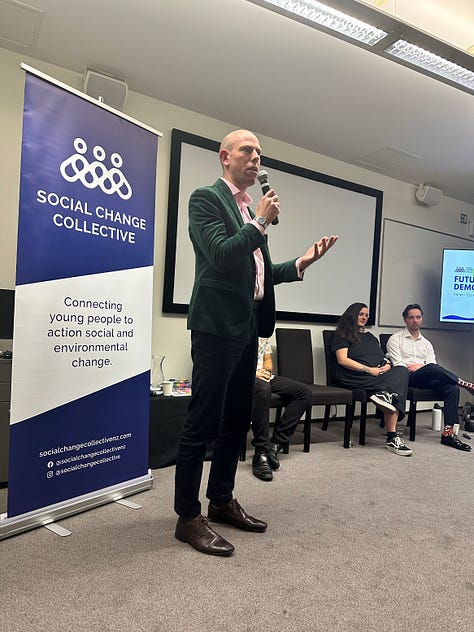

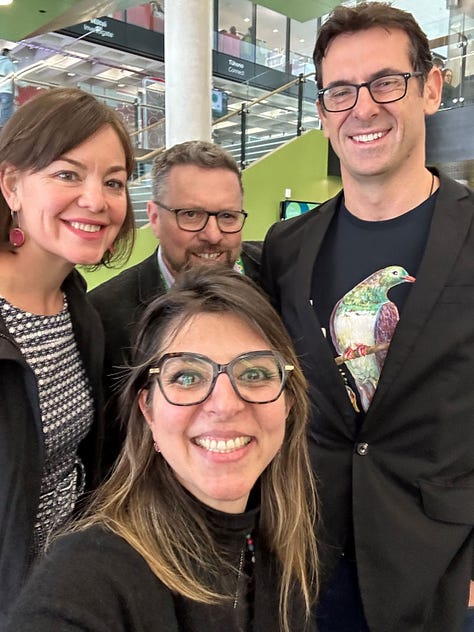
Important NOTE:
My commitment to compromise and the middle ground should not be mistaken for having weak or flaky principles, ethics, or integrity. I hold firm convictions and views regarding where I believe my taxes should be allocated, the role of government in addressing certain issues, and the support I offer to different groups. However, the aim of this newsletter is to highlight the intersection of these contradictions and debunk the notion that we must always be certain and unequivocally correct. This false dichotomy is deeply problematic and warrants time to debunk.
But fear not, whanau! Despite the chaos and confusion, there's hope. Because if there's one thing I've learned from all this, it's that conversation is key. So let's keep talking, keep listening, and maybe—just maybe—we'll find some common ground in this crazy world of ours.
See you next Tuesday!




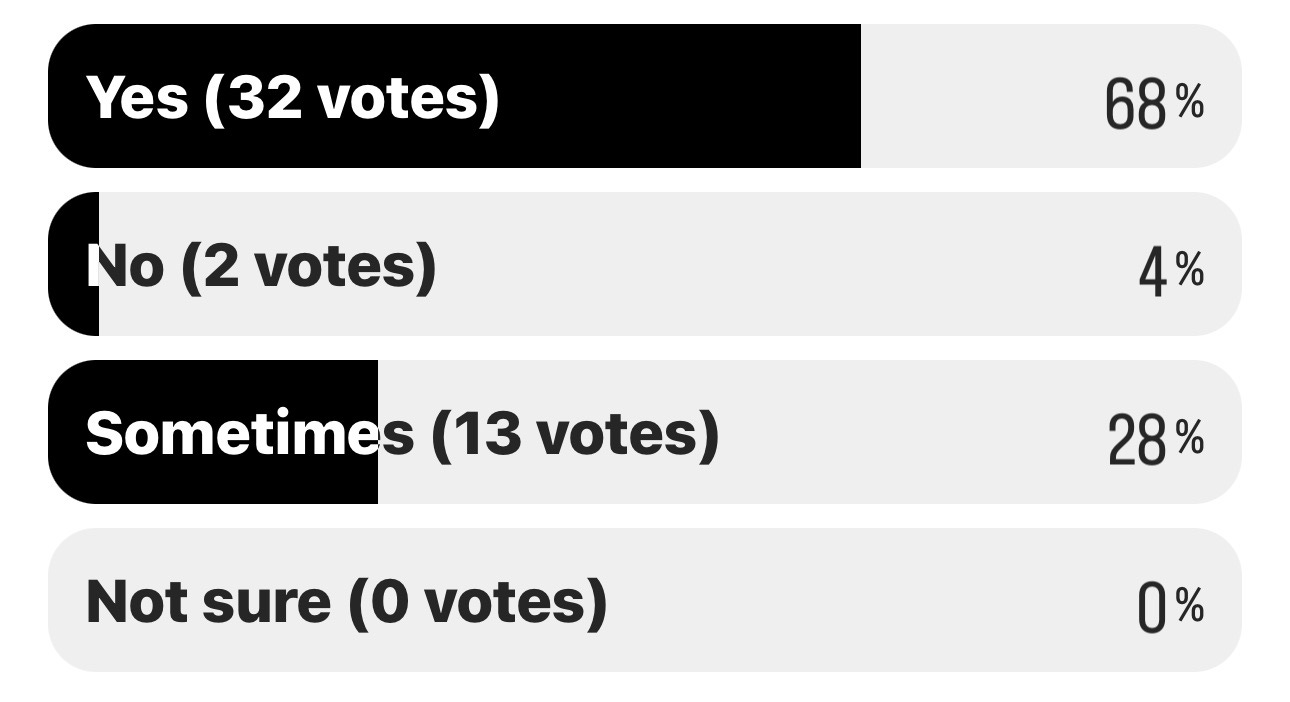
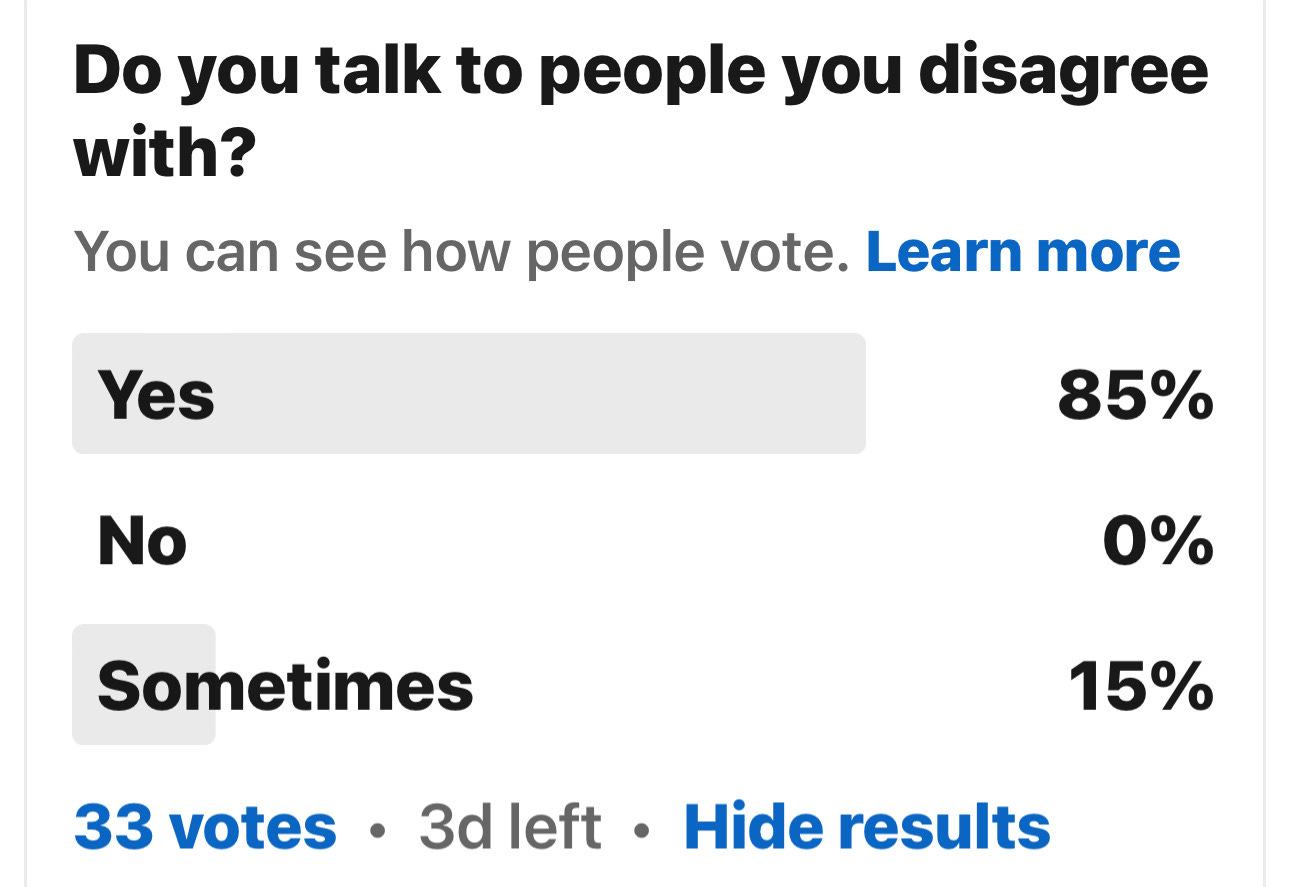
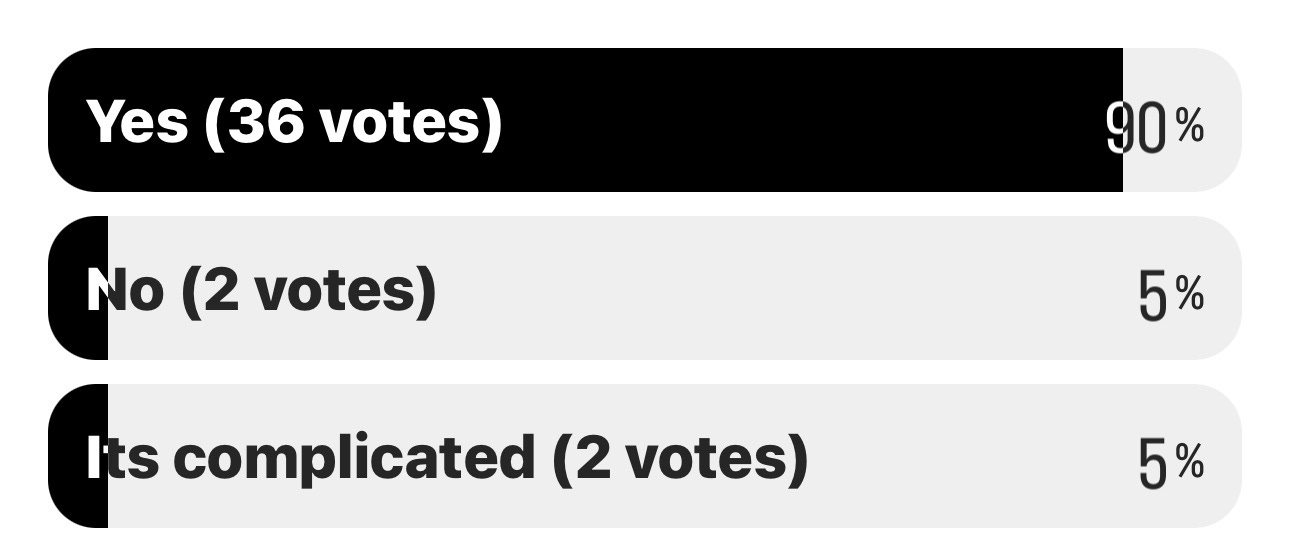
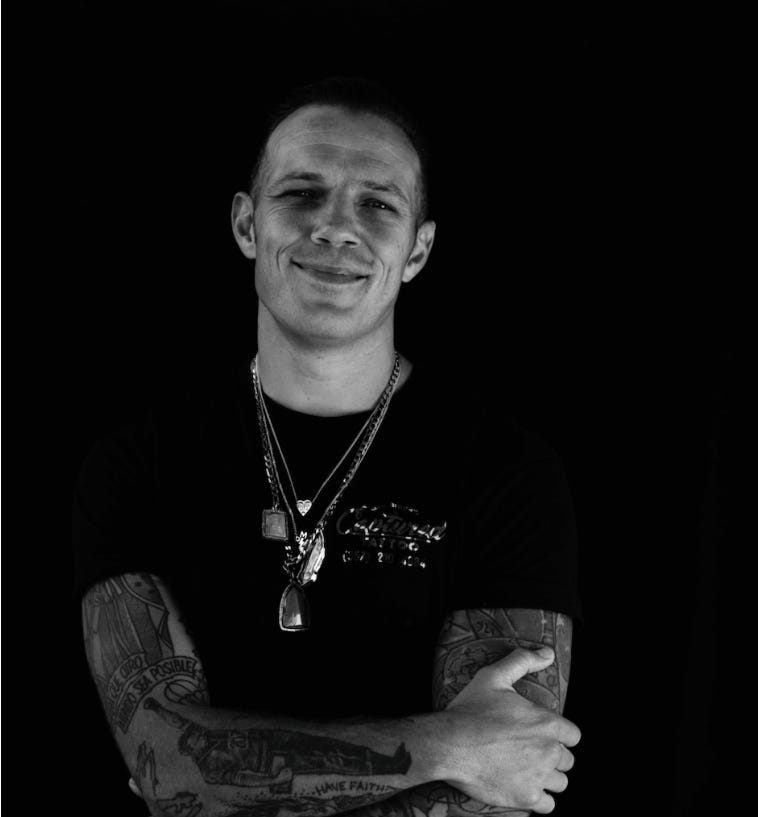
I think the most polarized subjects in NZ society right now is the value of Covid vaccinations. I am already getting peoples backs up. When Covid vaccines arrived, we were told vaccines would stop Covid infection and transmission, and they were compulsory. That dogmatic declaration from the only pulpit of truth was totally wrong, but Ardern never apologized for being wrong. Her way of dealing with people that disagreed with her was to cancel them, and discriminate against them, and shun them and isolate them. It went on for months, and now that has become the normal way to disagree with someone. It worked so well for Ardern that she had to run away with her tail between her legs. And now we are left with her legacy of just being kind to those who agree with you, and dissing the rest. Isnt that exactly what you are describing in your article ? And I still dont believe that Covid vaccines have any value. What about you ?